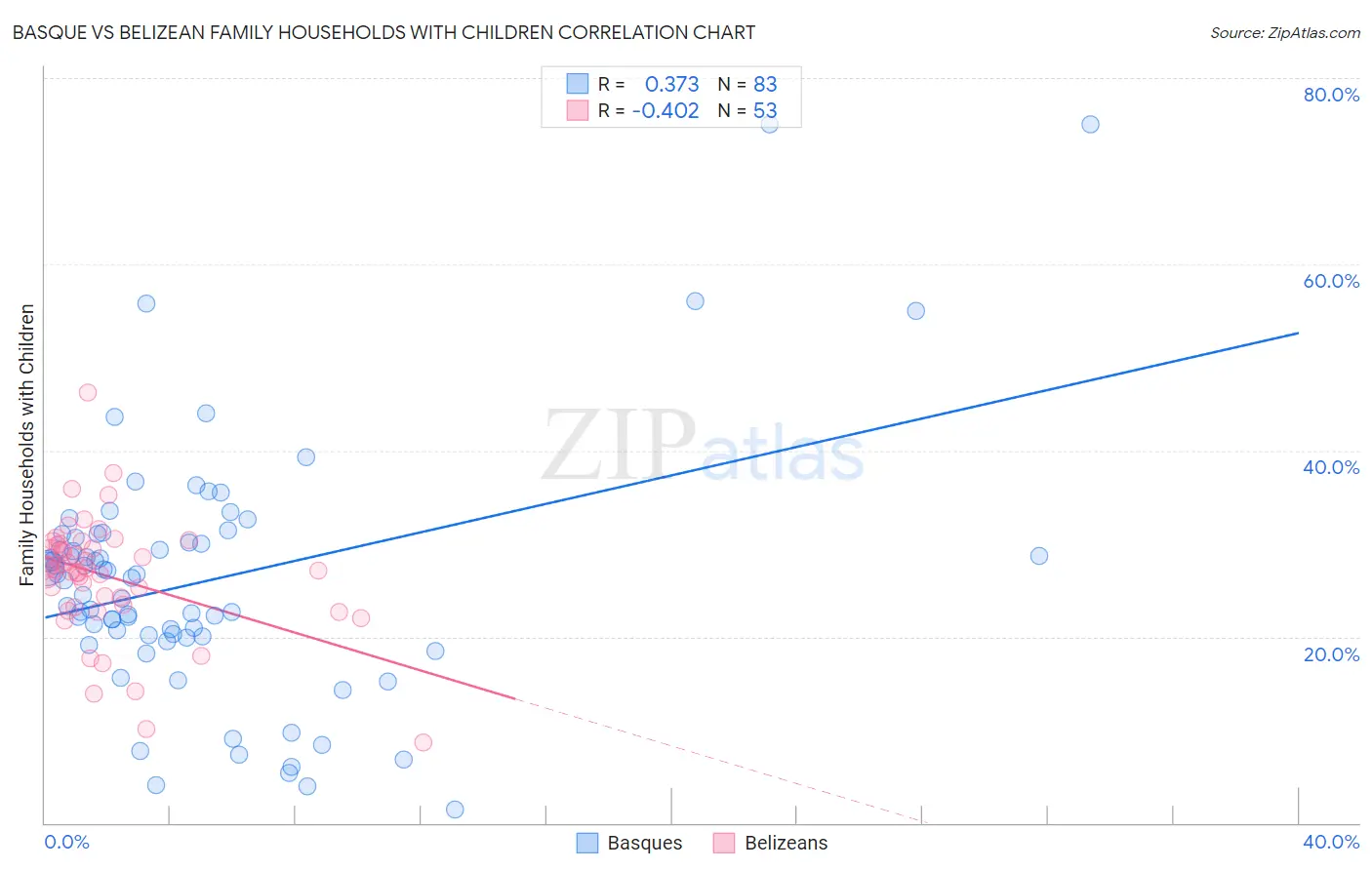Basque vs Belizean Family Households with Children
COMPARE
Basque
Belizean
Family Households with Children
Family Households with Children Comparison
Basques
Belizeans
27.7%
FAMILY HOUSEHOLDS WITH CHILDREN
79.5/ 100
METRIC RATING
146th/ 347
METRIC RANK
27.8%
FAMILY HOUSEHOLDS WITH CHILDREN
90.0/ 100
METRIC RATING
127th/ 347
METRIC RANK
Basque vs Belizean Family Households with Children Correlation Chart
The statistical analysis conducted on geographies consisting of 165,699,592 people shows a mild positive correlation between the proportion of Basques and percentage of family households with children in the United States with a correlation coefficient (R) of 0.373 and weighted average of 27.7%. Similarly, the statistical analysis conducted on geographies consisting of 144,146,110 people shows a moderate negative correlation between the proportion of Belizeans and percentage of family households with children in the United States with a correlation coefficient (R) of -0.402 and weighted average of 27.8%, a difference of 0.46%.

Family Households with Children Correlation Summary
| Measurement | Basque | Belizean |
| Minimum | 1.5% | 8.6% |
| Maximum | 75.0% | 46.2% |
| Range | 73.5% | 37.6% |
| Mean | 26.0% | 26.4% |
| Median | 26.3% | 27.3% |
| Interquartile 25% (IQ1) | 20.0% | 23.3% |
| Interquartile 75% (IQ3) | 30.6% | 29.9% |
| Interquartile Range (IQR) | 10.6% | 6.6% |
| Standard Deviation (Sample) | 13.3% | 6.5% |
| Standard Deviation (Population) | 13.2% | 6.4% |
Demographics Similar to Basques and Belizeans by Family Households with Children
In terms of family households with children, the demographic groups most similar to Basques are Immigrants from Chile (27.7%, a difference of 0.0%), Brazilian (27.7%, a difference of 0.010%), Immigrants from Eastern Africa (27.7%, a difference of 0.030%), Swiss (27.7%, a difference of 0.070%), and Spanish (27.7%, a difference of 0.080%). Similarly, the demographic groups most similar to Belizeans are Syrian (27.8%, a difference of 0.020%), Immigrants from Ethiopia (27.8%, a difference of 0.030%), Immigrants from Eritrea (27.8%, a difference of 0.040%), Cajun (27.7%, a difference of 0.13%), and Lebanese (27.7%, a difference of 0.14%).
| Demographics | Rating | Rank | Family Households with Children |
| Immigrants | Ethiopia | 90.5 /100 | #126 | Exceptional 27.8% |
| Belizeans | 90.0 /100 | #127 | Exceptional 27.8% |
| Syrians | 89.7 /100 | #128 | Excellent 27.8% |
| Immigrants | Eritrea | 89.4 /100 | #129 | Excellent 27.8% |
| Cajuns | 87.6 /100 | #130 | Excellent 27.7% |
| Lebanese | 87.4 /100 | #131 | Excellent 27.7% |
| Immigrants | Belize | 85.7 /100 | #132 | Excellent 27.7% |
| Iranians | 85.2 /100 | #133 | Excellent 27.7% |
| Immigrants | Panama | 84.9 /100 | #134 | Excellent 27.7% |
| Immigrants | Ecuador | 84.6 /100 | #135 | Excellent 27.7% |
| Immigrants | Portugal | 84.1 /100 | #136 | Excellent 27.7% |
| Immigrants | Dominican Republic | 83.9 /100 | #137 | Excellent 27.7% |
| Uruguayans | 83.2 /100 | #138 | Excellent 27.7% |
| Vietnamese | 82.6 /100 | #139 | Excellent 27.7% |
| Spanish | 81.8 /100 | #140 | Excellent 27.7% |
| Immigrants | Eastern Asia | 81.7 /100 | #141 | Excellent 27.7% |
| Swiss | 81.4 /100 | #142 | Excellent 27.7% |
| Immigrants | Eastern Africa | 80.2 /100 | #143 | Excellent 27.7% |
| Brazilians | 79.6 /100 | #144 | Good 27.7% |
| Immigrants | Chile | 79.5 /100 | #145 | Good 27.7% |
| Basques | 79.5 /100 | #146 | Good 27.7% |